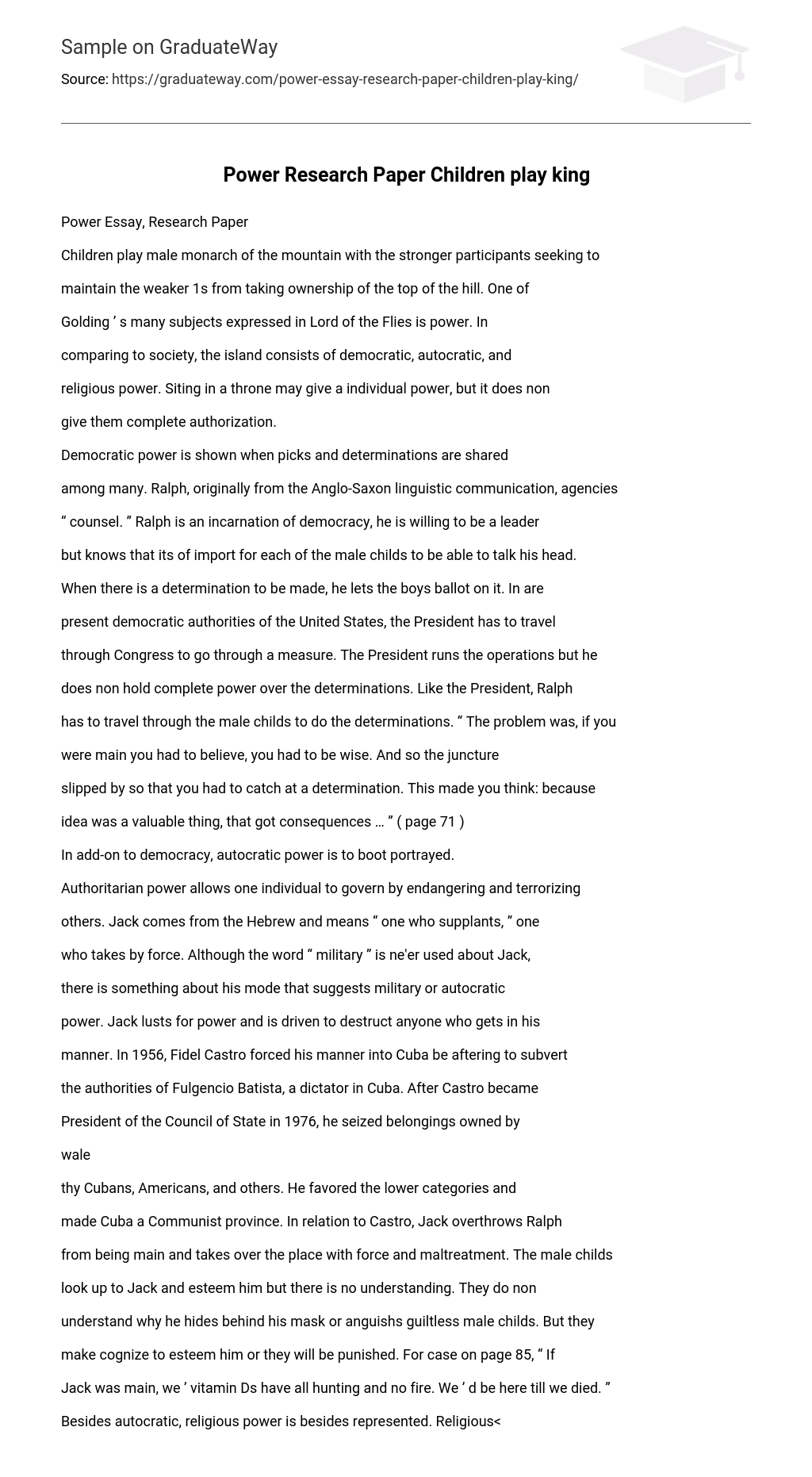Golding explores the theme of power in Lord of the Flies. He depicts different forms of power on the island, including democratic, autocratic, and religious power. While sitting on a throne can grant someone power, it does not necessarily give them absolute authority.
Democratic power is displayed through the distribution of choices and decisions among multiple individuals. Ralph, originating from the Anglo-Saxon language, means “advice.” Ralph embodies democracy as he is willing to be a leader but recognizes the importance of each boy being able to express their opinions.
When decisions need to be made, both the President in the current democratic system of the United States and Ralph allow others to have a say. The President must go through Congress to pass a measure, indicating that he does not have complete authority over decisions. Similarly, Ralph must consult with the boys in order to make decisions. According to page 71, being chief requires thinking and intelligence as quick decision-making is necessary. This highlights the value and consequences of thinking.
Although the text portrays democracy, it also showcases autocratic power. Autocratic power refers to ruling through threats and intimidation by a sole individual. Jack, whose name originates from Hebrew meaning “one who supplants,” personifies forceful seizure. Although not directly associated with the term “military,” Jack’s actions strongly demonstrate characteristics of military or autocratic power. He possesses an overwhelming desire for authority and is resolute in eliminating those who resist him.
In 1956, Fidel Castro forcefully entered Cuba with the intention of overthrowing the government of Fulgencio Batista, a dictator in Cuba. Once Castro became President of the Council of State in 1976, he confiscated property belonging to wealthy Cubans, Americans, and others. He displayed favoritism towards the lower classes and transformed Cuba into a Communist state.
Similarly to Castro’s actions, Jack overthrows Ralph and takes control through force and abuse. The boys admire and respect Jack but fail to fully understand his hidden motives or his cruel actions towards innocent boys. However, they are aware that displaying respect is necessary or else they will be subjected to punishment.
An example can be found on page 85…
“If Jack were in charge, we would all be hunting instead of making fire. We would remain here until our demise.” Furthermore, religious authority is also depicted. Religious authority acknowledges both the internal and external domains and strives to unite them. The name Simon originates from Hebrew and signifies “listener.” It was also the designation of one of Jesus’ apostles, Simon Peter. This suggests the religious role that the character will fulfill in the story: Simon is the only one who perceives and understands the truth. At the onset of the narrative, Simon is introduced as a “thin, vibrant little boy” with epilepsy.
In ancient times, it was believed that experiencing an epileptic seizure indicated that an individual possessed extraordinary religious abilities and was chosen to receive divine messages. Ironically, Simon, instead of being blessed by a loving deity, communicates with a malevolent entity. In 1933, Adolf Hitler perpetrated a brutal mass murder of many people considered “impure” due to their religious beliefs. The Jewish population, whom Hitler blamed for Germany’s problems, was systematically exterminated in concentration camps. This historical atrocity is reminiscent of Simon’s demise, as he is also killed by the intense conviction the boys have in the existence of the beast. Simon, who is meek and easily intimidated, feels a desperate urge to speak; however, addressing the group is an utterly terrifying prospect for him. (page 82)
Various forms of power, including democratic, autocratic, and religious power, play a crucial role in the narrative. Each character utilizes one of these forms of power, highlighting how individuals’ use of power determines their authority and dominance.





